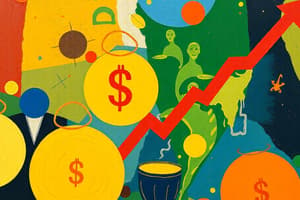Podcast
Questions and Answers
Economics is the study of how human beings coordinate their ______ and desires.
Economics is the study of how human beings coordinate their ______ and desires.
wants
What are the three central coordination problems facing any economy?
What are the three central coordination problems facing any economy?
What to produce, how to produce it, and for whom to produce it.
Scarcity arises because individuals want more than is available, given how much they're willing to work.
Scarcity arises because individuals want more than is available, given how much they're willing to work.
True (A)
The quantity of goods, services, and usable resources depends on technology and human action.
The quantity of goods, services, and usable resources depends on technology and human action.
The answer to scarcity is ______.
The answer to scarcity is ______.
What are the two main branches of economics?
What are the two main branches of economics?
Which of the following topics is primarily macroeconomic?
Which of the following topics is primarily macroeconomic?
Why do economists use the term 'marginal' when referring to costs and benefits?
Why do economists use the term 'marginal' when referring to costs and benefits?
Sunk costs are relevant in the economic decision rule.
Sunk costs are relevant in the economic decision rule.
What is opportunity cost?
What is opportunity cost?
What is the economic decision rule?
What is the economic decision rule?
What does the acronym TANSTAAFL stand for?
What does the acronym TANSTAAFL stand for?
Economic reasoning, once learned, is infectious.
Economic reasoning, once learned, is infectious.
Economic reasoning is based on the premise that everything has a cost.
Economic reasoning is based on the premise that everything has a cost.
What are implicit costs?
What are implicit costs?
What are sunk costs?
What are sunk costs?
Economics is not boring.
Economics is not boring.
What is enrichment, in the context of economics?
What is enrichment, in the context of economics?
Economic insights are based on generalizations called ______
Economic insights are based on generalizations called ______
Theories are usually too abstract to apply in specific cases.
Theories are usually too abstract to apply in specific cases.
What is an economic model?
What is an economic model?
What is the difference between theorems and precepts?
What is the difference between theorems and precepts?
Economic analysis is not impacted by technological advancements.
Economic analysis is not impacted by technological advancements.
What is the invisible hand theorem?
What is the invisible hand theorem?
What happens to the price of a good when the quantity supplied exceeds the quantity demanded?
What happens to the price of a good when the quantity supplied exceeds the quantity demanded?
What is the invisible hand?
What is the invisible hand?
The invisible hand always works perfectly.
The invisible hand always works perfectly.
What is the efficiency theorem?
What is the efficiency theorem?
Economics is about the study of what is and how the economy works.
Economics is about the study of what is and how the economy works.
The invisible hand theorem automatically implies that the government should not intervene in the economy.
The invisible hand theorem automatically implies that the government should not intervene in the economy.
What is normative economics?
What is normative economics?
What is the art of economics?
What is the art of economics?
What are economic institutions?
What are economic institutions?
Economic institutions are always neutral.
Economic institutions are always neutral.
Economic policies represent actions or inaction taken by government to influence economic actions.
Economic policies represent actions or inaction taken by government to influence economic actions.
Economic policies operate outside of economic institutions.
Economic policies operate outside of economic institutions.
Economic policies have no impact on existing economic institutions.
Economic policies have no impact on existing economic institutions.
Good economic policy analysis is objective.
Good economic policy analysis is objective.
Positive economics is the study of what should be, and how the economy should work.
Positive economics is the study of what should be, and how the economy should work.
Economic theory always provides definitive policy recommendations.
Economic theory always provides definitive policy recommendations.
Normative economics is the study of what the goals of the economy should be.
Normative economics is the study of what the goals of the economy should be.
Economists always agree on the best economic policies.
Economists always agree on the best economic policies.
The art of economics is the application of the knowledge learned in positive economics to solve problems.
The art of economics is the application of the knowledge learned in positive economics to solve problems.
Market forces are always operative.
Market forces are always operative.
The choice of policy depends solely on economic theory.
The choice of policy depends solely on economic theory.
Economic policies should focus on the largest gains.
Economic policies should focus on the largest gains.
Maintaining objectivity is easiest in positive economics.
Maintaining objectivity is easiest in positive economics.
Maintaining objectivity is hardest in the art of economics.
Maintaining objectivity is hardest in the art of economics.
Modern economists are more likely to let the data speak than are earlier economists.
Modern economists are more likely to let the data speak than are earlier economists.
The art of economics involves making choices where no objective is possible.
The art of economics involves making choices where no objective is possible.
The art of economics involves making judgments about how non-economic forces work.
The art of economics involves making judgments about how non-economic forces work.
Flashcards
Economics
Economics
The study of how people coordinate their wants and desires, considering social customs, political realities, and decision-making mechanisms.
Coordination (in economics)
Coordination (in economics)
How economies solve the three central problems: what to produce, how to produce it, and for whom to produce it.
Central Economic Problem
Central Economic Problem
The fundamental economic questions of what to produce, how to produce it, and for whom to produce it.
Scarcity
Scarcity
Signup and view all the flashcards
Microeconomics
Microeconomics
Signup and view all the flashcards
Macroeconomics
Macroeconomics
Signup and view all the flashcards
Economic Reasoning
Economic Reasoning
Signup and view all the flashcards
Marginal Cost
Marginal Cost
Signup and view all the flashcards
Marginal Benefit
Marginal Benefit
Signup and view all the flashcards
Economic Decision Rule
Economic Decision Rule
Signup and view all the flashcards
Sunk Cost
Sunk Cost
Signup and view all the flashcards
Opportunity Cost
Opportunity Cost
Signup and view all the flashcards
TANSTAAFL
TANSTAAFL
Signup and view all the flashcards
Market Force
Market Force
Signup and view all the flashcards
Invisible Hand
Invisible Hand
Signup and view all the flashcards
Social Force
Social Force
Signup and view all the flashcards
Political Force
Political Force
Signup and view all the flashcards
Positive Economics
Positive Economics
Signup and view all the flashcards
Normative Economics
Normative Economics
Signup and view all the flashcards
Art of Economics
Art of Economics
Signup and view all the flashcards
Economic Policy
Economic Policy
Signup and view all the flashcards
Implicit Costs
Implicit Costs
Signup and view all the flashcards
Illusionary Sunk Costs
Illusionary Sunk Costs
Signup and view all the flashcards
Economic Institutions
Economic Institutions
Signup and view all the flashcards
Study Notes
Economics and Economic Reasoning
- Economics is the study of how people coordinate their desires within a society.
- Key elements of economics
- What to produce
- How to produce it
- For whom to produce it
- Scarcity exists because wants are exceeding resources.
- Economic forces are influenced by social and political forces.
Studying That Suits You
Use AI to generate personalized quizzes and flashcards to suit your learning preferences.




